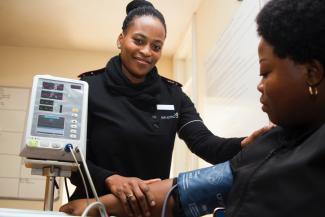Authors: Arrthy Thayaparan and Alex Lukey (Blog Coordinators)
Published: May 21st, 2021
What do eight percent of pregnant women from around the world, including the likes of Beyoncé and Kim Kardashian, have in common? Complications due to high blood pressure.
Known as the ‘silent killer’ due to its ability to go undetected, high blood pressure is often misdiagnosed and treated less in women than in men, said Professor Angela Maas director of the Netherlands Women’s Cardiac Health Program.
For middle-aged women, symptoms such as hot flashes and heart palpitations, are often attributed to menopause. This mislabelling puts women at risk for serious heart conditions that could be avoided.
“A woman’s life provides clues that you need to start early with prevention. We have to assess female patients differently to men, and not just ask about high cholesterol,” said Professor Maas in a recent article with Science Daily.
But before understanding how high blood pressure can be better diagnosed and supported in women, we need to know exactly what high blood pressure is.
What is high blood pressure?
Also known as hypertension, high blood pressure happens when the blood vessels that carry blood around the body constrict, narrowing the blood’s space to pass. This constriction causes damage as blood pushes against the walls of the vessels. High blood pressure also makes the heart work harder to pump blood around the body.
The risk of untreated high blood pressure impacts almost every system in the body. As blood vessels around the body accumulate damage, they become weaker and less elastic. The organs that vessels bring blood to can become damaged over time, leading to the risk of multiple diseases. High blood pressure contributes to many life-threatening conditions such as heart disease, stroke and kidney damage.
Why might high blood pressure be dismissed in women?
Until the onset of menopause, women are at lower risk for hypertension than men due to the protective effects of estrogen on blood vessels.
After menopause, there is evidence that high blood pressure is not as well recognized and treated in women. As many as 41% of post-menopausal women have high blood pressure. For many women, symptoms related to high blood pressure are attributed to stress or menopause symptoms.
Here is the list of potential symptoms of menopause that may mask signs of high blood pressure
- Palpitations
- Hot flushes
- Headaches
- Chest pain
- Tiredness
- Sleeping disturbances
According to Professor Maas, there are several subgroups of women that can be identified as high-risk before it is too late.
“High blood pressure during pregnancy is a warning sign that hypertension may develop when a woman enters menopause … If blood pressure is not addressed when women are in their 40s or 50s, they will have problems in their 70s when hypertension is more difficult to treat,” she said.
How do I know if I have high blood pressure?
It is essential to know what your baseline blood pressure numbers are to track changes over time.
You can take your blood pressure at most pharmacies. Taking your blood pressure outside of the doctor’s office may give a more accurate measure of blood pressure since many people feel nervous in appointments, potentially leading to an artificial increase in blood pressure.
Hypertension Canada Guidelines state that if your systolic blood pressure (top number) is more than 135 or diastolic blood pressure (bottom number) is more than 85, you may have high blood pressure.
If you are concerned that you have high blood pressure, you should talk to your primary care doctor or nurse practitioner.
How can women be safeguarded from hypertension?
Dr. Maas and her team authored a publication for the European Society of Cardiology with recommendations on how to help middle-aged women prevent heart problems due to high blood pressure.
They stress the importance of a healthy lifestyle and diet, especially in women who are at higher risks of high blood pressure during pregnancy and women who have type 2 diabetes.
But most importantly, the need for collaboration between cardiologists, gynecologists, and endocrinologists is needed to provide women with the best care.
Dr. Maas notes that women need to work as a team with their doctors to watch for signs and symptoms of high blood pressure.
“Women can help their doctors prevent heart problems and make earlier diagnoses by mentioning issues like complicated pregnancies and early menopause and monitoring their own blood pressure.”
Photo by Hush Naidoo on Unsplash
